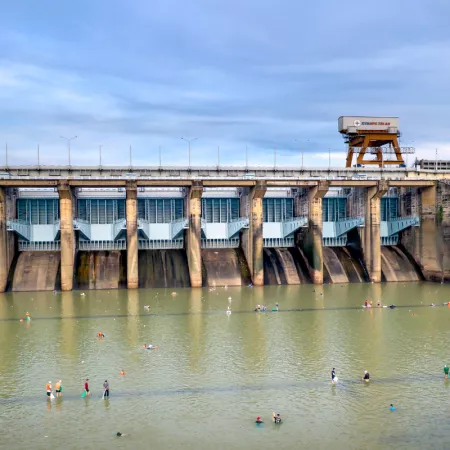Massanjore Dam Travel Guide
Massanjore Dam is a marvel nestled in the state of Jharkhand, India. Built on the Mayurakshi River, this engineering wonder serves as a significant irrigation and hydroelectricity generation source. The dam is not only a symbol of modern infrastructure but also a picturesque spot attracting tourists for its scenic beauty and recreational activities. Massanjore Dam holds historical importance as it was constructed post-independence to aid in agricultural development in the region.Top Attractions in Massanjore Dam
- Massanjore Dam Reservoir
- Panchet Dam
- Mayurakshi River
- Pakur Guava Gardens
- Nirmal Hriday Church
Massanjore Dam is Famous for
Adventure enthusiasts flock to Massanjore Dam for its thrilling water sports and breathtaking views.Top Attractions in Massanjore Dam
- Boating on the Reservoir
- Water Skiing
- Visiting the nearby Panchet Dam
- Exploring the lush Guava Gardens
- Experiencing the tranquility of the Mayurakshi River
What's Great about Travelling to Massanjore Dam?
- Perfect for nature lovers
- Adventurous water activities
- Scenic beauty for photography enthusiasts
What's Not So Great about Travelling to Massanjore Dam?
- Limited accommodation options
- Remote location may pose transportation challenges
- Not ideal for travelers seeking a bustling city experience
Travel Tips for Massanjore Dam
- Carry sunscreen and hats for sun protection
- Check for accommodation availability in advance
- Respect local customs and traditions
Important Massanjore Dam trip information
- Ideal Duration: 2-3 days
- Best Time to Visit: October to March
- Nearby Airports and Railway Stations: Deoghar Airport and Jasidih Junction
FAQ's on Massanjore Dam
Q1: What is the best time to visit Massanjore Dam?
The best time to visit Massanjore Dam is during the winter months from October to March when the weather is pleasant for exploring the area. Avoid the monsoon season from June to September as heavy rainfall can affect travel plans. Consider visiting during the spring season from March to May to witness the blooming flora and enjoy outdoor activities.
Q2: Do I need a visa to travel to Massanjore Dam?
Travelers visiting Massanjore Dam typically do not need a visa as it is a domestic destination within India. However, if you are an international traveler, ensure you have a valid Indian visa. Check with the Indian embassy in your country for specific visa requirements and any exceptions for visiting this region.
Q3: What are the must-visit attractions in Massanjore Dam?
Must-visit attractions in Massanjore Dam include the impressive Massanjore Dam itself, the serene Massanjore Lake for boating and picnics, and the beautiful Pakur district known for its scenic beauty and cultural heritage. Don't miss the nearby tribal villages to experience the local way of life.
Q4: Is Massanjore Dam a safe place to travel?
Massanjore Dam is generally a safe place to travel. Like any destination, it is advisable to take usual precautions such as safeguarding your belongings and avoiding isolated areas, especially at night. Stay aware of your surroundings and follow local advice to ensure a safe and enjoyable trip.
Q5: What is the local currency in Massanjore Dam and can I use credit cards?
The local currency in Massanjore Dam is the Indian Rupee (INR). While credit cards may not be widely accepted in rural areas, you can use them in larger establishments and hotels. It's recommended to carry sufficient cash for smaller purchases and transactions. ATMs are available in nearby towns for cash withdrawals.
Q6: What is the local cuisine like in Massanjore Dam?
The local cuisine in Massanjore Dam offers a variety of delicious dishes, including regional specialties like litti-chokha, mutton curry, and pithas. Vegetarians can enjoy dishes like dal bati churma and aloo posto. Don't miss trying the local sweets like malpua and chhena poda for a sweet treat.
Q7: What transportation options are available in Massanjore Dam?
Transportation options in Massanjore Dam include buses, taxis, and auto-rickshaws for local travel. You can also rent a car or hire a driver for more flexibility in exploring the region. Public transport is available to nearby towns, and private cabs can be arranged for longer distances.
Q8: Are there any cultural norms or etiquette I should be aware of when visiting Massanjore Dam?
When visiting Massanjore Dam, respect the local customs and traditions. It is advisable to dress modestly, especially when visiting religious sites. Seek permission before taking photographs of locals, and greet people with a polite "Namaste." Avoid public displays of affection, and always remove your shoes before entering someone's home or a place of worship.
Q9: I am a travel agent. How can I buy travel leads of Massanjore Dam?
Register yourself as a travel agent at agents.tripclap.com and then you can buy travel leads to Massanjore Dam once your account is approved. For more details contact our support team at +91-8069186564 or support@tripclap.com

